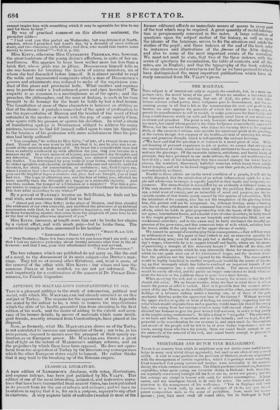THE MALT-TAX.
Inns subject is of interest not only as regards the comforts, bit, in a more lin- portant view, the moral being of the poor. When sve mention a fact which did annot transpire at the late meeting, that out of `2.1d., time price of that mleho terious mixture called porter, three halfpence goes to Government, and the re- mauling penny is all that is left as the remuneration for cost and profit to the brewer, we may suppose the materials of which this mixture is composed, Is permit its manufacturers to roll in wealth, to make provisions for their family. and keep establishments vv filch vie with and frequently excel those of our aristocracy in extent and grandeur. The point. is not, however, whether the brewer receise's too much, but outof whose pocket is the three halfpence so mercilessly squeezed %'Vhose, but the sun-burnt labourer, who slakes his burning thirst in the stagnant ditch, or the emaciated artisan. who recruits his enervated spirits at the gin-shop, at the certain though slow expense of his health—instead of enjoying the whole- ',some and generous draught, which is indisputably the national beverage. ss`lVe have said that the question is of interest in a moral point of view. With- out boasting of personal experience in gin or porter, we cannot shut our eyes to the vast increase of crime, which has been solely attributed to those haunts of vice and suits the gin-shops. Of the incurable laziness, sottishness, and fearful laxity of principle they have produced in our male artisans, the gaols and workhouses can best testify ; and of the debauchery they have caused amougst the lower fem:de classes, the wretched, blear-eyed, half-clad wretches which haunt those unhal- lowed temples, and are to be found staggering near their portals, will afford ample. and melancholy evidence.
Fearful as these etlects are on the moral condition of a people, it will not be readily disputed, that the substitution of an ardent inflammatory spirit, for a sim- ple and wholesome beverage, is equally baneful to their health and temporary en- joyments. The dram-drinker is recognited by an evidently debilitated frame, as if the very marrow of his joints were dried up by the perishing fluid: premature age, a total want of energy, and an imbecility of mind and purpose, are the in- variable results of that frantic gaiety caused by this species of intoxication. With the inhabitant of the country, who has not the temptation of the gin-shop before him, this picture will not he recognised : he, although fainting under a burning sun, has no other refreshment at his command but what the ditch or stagnant pool affords, which lie holds in joint proprietorship with the beasts of the field. May not agues, intermittent fevers, and a fearful train of other disorders, be fairly traced to this simple privation ? Thus are our hospitals and infirmaries filled, and our workhouses crowded; and to this cause may be fairly attributed the dreadful op- pression of the poor-rates, and that numerous train of evils which, exhaling from the lower, strike at the very heart of the upper classes of society.
We cannot be accused of overcharging these consequences,—they will bear even an arithmetical test. If a quart of beer (which is not an excessive quantity for a hard-working man) cost ad. and he gets but a shilling or eighteeimpence fur a day's wages, wherewith he is to support himself and family, where are his means of purchasing a draught of this necessary luxury ? But take off the duty, and he has the whole quantity which he may reasonably desire for twopence—a mite which he can spare even out of his hard-earned wages, and the revenue of nei- ther the publican nor the brewer injured by the diminution. The consequence would be highly beneficial in another respect,—it would be the means of knock- in up that monopoly which has hitherto confined an important branch of our domestic commerce into a very contracted circle. The means of competition would be easily afforded, and the public no longer necessitated to drink whatever trash time brewer or the publican chose to pour down their throats. When so crying the evil, and so simple the remedy, the miracle is that the evil should still exist. We no longer wonder, when we hear in mind those in whose hands the power relief is vested. How is it possible that the scented aristo- cracy of the one House, or the wealthy Commoners of the other, can enter into the feelings of a labourer sinking under a burning sun, or of those of the pale mechanic fainting under the oppressive heat of time factory ? Without accusing the upper circles of apathy or want of feeling, we cannot help suspecting that the relief which would originate from such a quarter, would resemble that of the young lady, who seeing from her carriage-window sonic half-starved object of charity, directed her footman to give the poor wretch half-a-crown, in order to buy pastry at the neighbouring confectioner's. So false a thing is " sympathy." The grievance, as we hare said before, is manifest, and so is the remedy ; and we hope, that all- powerful as the consideration for our revenue is, and must needs be, the comforts andanorals of the people will be felt to be of even higher importance : and We kDOW, among those who have the power, there are sound heads enough to see the necessity of the removal of the evil, and sound hearts enough to prevent its longer contiiming,.


















 Previous page
Previous page